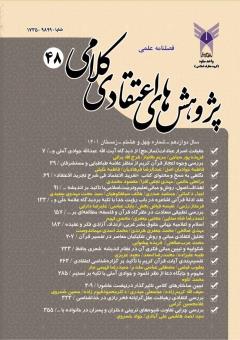شکواییه و تبیین مبانی فکری آن در نظام اندیشه شعری حافظ
محورهای موضوعی : کلام اسلامیطیبه علیزاده 1 , محمد رضا اسعد 2 , مجید عزیزی 3
1 - دانشگاه آزاد اراک
2 - دانشگاه آزاد اراک
3 - دانشگاه آزاد اراک
کلید واژه: ادبیات غنایی, شعر, شکواییه, اندیشه کلامی, حافظ شیرازی,
چکیده مقاله :
شكواييه گونه اي از ادبيات غنايي است كه در آن شاعر مي كوشـد تـا عامـل رنج وآزردگي خاطر خود را براي مخاطب روشن كند. به طـور كلـي شـكواييه را براساس موضوع مي توان به پنج دستۀ شخصی، فلسفی، اجتماعی، عرفانی و سیاسی تقـسيم كـرد. حافظ از جمله شاعران برجستۀ زبان فارسی است که در اشعار خود به انواع شکواییه پرداخته است. در پژوهش حاضر که به روش تحلیل محتوایی انجام گرفته است، به شکواییه و تبیین مبانی فکری آن درنظام اندیشه شعری حافظ پرداخته ایم. براساس نتایج بدست آمده از پژوهش و با توجه به اینکه اشعار هر شاعر نماد درونیات آن شاعرمی باشد، بدیهی است آن چه حافظ را به گله و شکایت و انتقاد واداشته در حقیقت واکنش به رفتارهای متظاهرانه دین فروشان ریاکار،واعظان ،حاکمان جبار و اوضاع سیاسی و اجتماعی نابسامان آن دوران و علاوه بر این ها جبر گرایی است که ریشه در نگاه فلسفی و چند و چون هستی و روزگار دارد و در واقع همین نگاه فلسفی است که اساس اندیشه کلامی حافظ را تشکیل داده است.
Complaint is a kind of lyrical literature in which the poet tries to explain the cause of his suffering and annoyance to the audience. In general, complaints can be divided into five categories: personal, philosophical, social, mystical, and political. Hafez is one of the prominent poets of the Persian language who has addressed various complaints in his poems Is. In the present study, which has been done by the method of content analysis, we have complained and explained its intellectual foundations in the system of Hafez's poetic thought. Based on the results of the research and considering that the poems of each poet are a symbol of the inner workings of that poet, it is obvious that what made Hafez complain and criticize is in fact a reaction to the demonstrative behaviors of hypocritical religious people, preachers, tyrants and political situations. And the unsettled society of that time and beyond On these is determinism, which is rooted in the philosophical view of existence and time, and in fact it is this philosophical view that has formed the basis of Hafez's theological thought.
